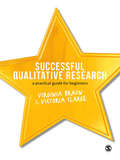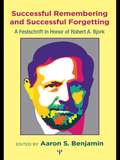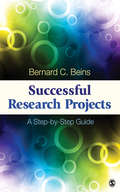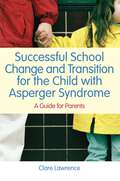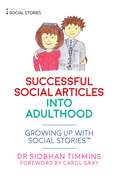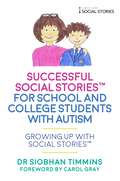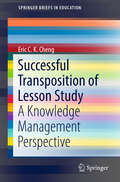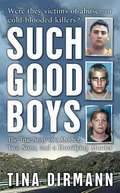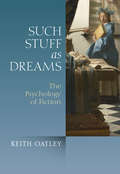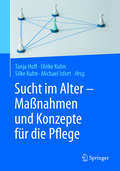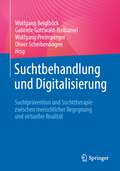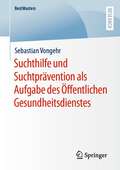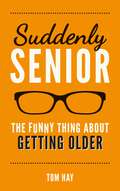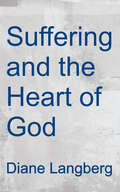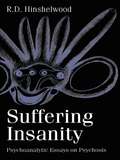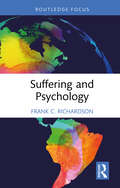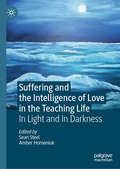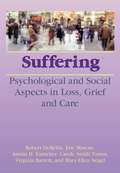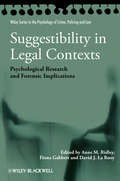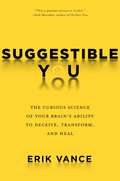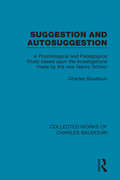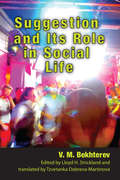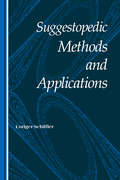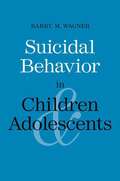- Table View
- List View
Successful Qualitative Research: A Practical Guide for Beginners
by Dr Victoria Clarke Virginia BraunSuccessful Qualitative Research: A Practical Guide for Beginners is an accessible, practical textbook. It sidesteps detailed theoretical discussion in favour of providing a comprehensive overview of strategic tips and skills for starting and completing successful qualitative research.<P><P> Uniquely, the authors provide a 'patterns framework' to qualitative data analysis in this book, also known as 'thematic analysis'. The authors walk you through a basic thematic approach, and compare and contrast this with other approaches. This discussion of commonalities, explaining why and when each method should be used, and in the context of looking at patterns, will provide you with complete confidence for your qualitative research journey. <P> Key features of this textbook:<P> - Full of useful tips and strategies for successful qualitative work, for example considering the nervous student not just the beginner student. <P> - Skills-based, utilising a range of pedagogical features to encourage you to apply particular techniques and learn from your experience. <P> - The authors use the same dataset throughout - reproduced in full (with associated research materials) on the companion website - to help you make comparisons across different analytical approaches.<P> - A comprehensive suite of student support materials, including practice exam questions, can be found online at www.sagepub.com/braunandclarke. <P> This textbook will be an essential textbook for undergraduates and postgraduates taking a course in qualitative research or using qualitative approaches in a research project.<P> Visit the Companion Website at www.sagepub.com/braunandclarke
Successful Remembering and Successful Forgetting: A Festschrift in Honor of Robert A. Bjork
by Aaron S. BenjaminThe chapters in this volume are testament to the many ways in which Robert Bjork’s ideas have shaped the course of research on human memory over four decades. It showcases the theoretical advances and recent findings by researchers whose work and careers have been influenced by Bjork. The first group of chapters explore the idea that forgetting is an adaptive response to the demands of a retrieval system fraught with competition - an idea that has helped recalibrate conceptualizations of memory away from one in which in which the computer is the dominant metaphor. Several chapters then review the application of research on learning and memory to enhancing human performance, reflecting Bjork’s staunch commitment to translating his findings and theories to real-world settings. Later chapters address topics that are relevant to the translation of cognitive psychology to human performance, and in particular recognize the critical role of metacognition in such problems. The final chapters cover a variety of issues related to how remembering can be enhanced, and how research on remembering can be profitably guided by the use of mathematical modeling. This volume will appeal to researchers and graduate students of human learning, memory, and forgetting, and will also benefit an audience working in applied domains, such as training and education.
Successful Research Projects: A Step-by-Step Guide
by Bernard C. Beins Inc. Sage PublicationsSuccessful Research Projects: A Step-by-Step Guide is a concise and accessible text that guides students through each component of the research process. Using a step-by-step active learning approach, acclaimed professor and researcher Dr. Bernard C. Beins discusses each of the key actions required for students to confidently develop, perform, analyze, and report the results of their research in a thorough, accurate, and methodologically sound manner. Throughout the text, they will discover not only how to complete each step, but how the steps at any point relate to other aspects of their research and writing.
Successful School Change and Transition for the Child with Asperger Syndrome
by Clare LawrenceMoving to a new school can be a daunting prospect for the child with Asperger syndrome, and parents are often left feeling powerless to help prevent the anxiety and loss of confidence which may ensue. Clare Lawrence's new book provides parents of children with Asperger syndrome with practical advice on how to prepare their child for moving to a new school, and how to help make the transition as smooth as possible. A wide range of material is covered, including useful guidance on choosing the right school, supporting the child during the period prior to the move, and identifying and practising the different social rules and expectations of the new school. The strategies in the book can be adapted for children of all ages and include working out a transition time-line, identifying a named adult and 'safe haven' at the school, and effective communication between parents, teachers and support staff. This clear and accessible book will be an invaluable resource for parents of children with AS who are moving to a new school, and will also be of interest to the teachers and education professionals who work with them.
Successful Social Articles into Adulthood: Growing Up with Social Stories™
by Siobhan TimminsThe third volume in the Growing Up with Social Stories™ series is specifically devoted to developing a social understanding around some of the most common issues faced by autistic young adults. Topics include applying for a job, looking after physical and mental health, and staying safe in a new home.
Successful Social Stories™ for School and College Students with Autism: Growing Up with Social Stories™
by Carol Gray Siobhan TimminsAs children grow up and spend more and more time away from home in schools and colleges, life often seems to get increasingly complicated. Autism makes the challenges they meet in these new environments even more difficult to navigate. Social Stories™ is a highly regarded strategy that parents and teachers can use to help young people with autism understand the new social situations they face during this time. Writing an effective Story takes a special set of skills, and in this fully illustrated book Dr Siobhan Timmins explains how to acquire and hone these techniques and put them into practice. Following on from her book on writing Social Stories™ for young children, this book on the next age group up includes 160 illustrations and clear examples based on the author's own experiences of raising a son with autism. She explains how to identify the underlying issues, and articulate the key ideas so that young learners can find connections between Stories to build a greater understanding of relationships, the adult world and their own identity. The book is an invaluable guide to creating bridges between young people and the parts of life they find most difficult.
Successful Transposition of Lesson Study: A Knowledge Management Perspective (SpringerBriefs in Education)
by Eric C. ChengThis book analyses the organisation cultures that promote Japanese Lesson Study, identifies the soul of lesson study, which is missing in other cultures, and discusses the conditions for successfully transplanting the Lesson Study to other cultures. Adopting Nonaka and Tateuchi’s (1995) SECI knowledge creation model as the analytical lens, it explores the tacit and explicit knowledge convention and creation processes in lesson study. Unpacking the mechanism of the knowledge management process and practices could assist policy makers and school administrators, educators in contextualising lesson study to their school systems. The book provides an accessible discussion of the benefits and challenges of introducing lesson study, and presents three new research dimensions to analyse it: reviewing the historical development of lesson study in terms of the pendulum swings between professional accountability and state accountability in developing the school-based curriculum and the national curriculum; examining lesson study as a knowledge management tool for creating pedagogical knowledge for curriculum implementation: and studying the “kaizen kata” embedded in the PDCA cycles of lesson study as an organization routine for school improvement.
Such Good Boys: The True Story of a Mother, Two Sons and a Horrifying Murder
by Tina DirmannAN ABUSIVE MOTHER: Raised in the suburb of Riverside, California, twenty-year-old college student Jason Bautista endured for years his emotionally disturbed mother's verbal and psychological abuse. She even locked him out of the house, tied him up with electrical cord, and on one occasion, gave him a beating that sent him to the emergency room. His fifteen-year-old half brother Matthew Montejo also was a victim to Jane Bautista's dark mood swings and erratic behavior, but for some reason, Jason received the brunt of the abuse―until he decided he'd had enough… <p><p> A SON'S REVENGE: On the night of January 14, 2003, Jason strangled his mother. To keep authorities from identifying her body, he chopped off her head and hands, an idea he claimed he got from watching an episode of the hit TV series "The Sopranos." Matthew would later testify in court that he sat in another room in the house with the TV volume turned up while Jason murdered their mother. He also testified that he drove around with Jason to find a place to dump Jane's torso. <p><p> A CRIME THAT WOULD BOND TWO BROTHERS: The morning following the murder, Matthew went to school, and Jason returned to his classes at Cal State San Bernardino. When authorities zeroed in on them, Jason lied and said that Jane had run off with a boyfriend she'd met on the Internet. But when police confronted the boys with overwhelming evidence, Jason confessed all. Now the nightmare was only just beginning for him…
Such Stuff as Dreams
by Keith OatleySuch Stuff as Dreams: The Psychology of Fiction explores how fiction works in the brains and imagination of both readers and writers.Demonstrates how reading fiction can contribute to a greater understanding of, and the ability to change, ourselvesInformed by the latest psychological research which focuses on, for example, how identification with fictional characters occurs, and how literature can improve social abilitiesExplores traditional aspects of fiction, including character, plot, setting, and theme, as well as a number of classic techniques, such as metaphor, metonymy, defamiliarization, and cuesIncludes extensive end-notes, which ground the work in psychological studiesFeatures excerpts from fiction which are discussed throughout the text, including works by William Shakespeare, Jane Austen, Kate Chopin, Anton Chekhov, James Baldwin, and others
Sucht im Alter – Maßnahmen und Konzepte für die Pflege
by Tanja Hoff Ulrike Kuhn Silke Kuhn Michael IsfortPraxiserprobte Maßnahmen für die Pflege älterer Suchtkranker.Schädlicher Substanzmittelkonsum oder eine Abhängigkeit werden bei älteren Menschen häufig nicht oder erst sehr spät bemerkt. Unerkannt können sie zu einem frühzeitigen Verlust der Selbständigkeit führen. Das Praxisbuch vereint die neusten wissenschaftlichen Erkenntnisse und Handlungsempfehlungen für eine qualifizierte Versorgung bei substanzbezogenen Störungen im Alter. Mitarbeiter der ambulanten und stationären Altenpflege werden unterstützt, Suchtprobleme zu erkennen und gezielt Maßnahmen einzuleiten. Die vorgestellten Praxiskonzepte fördern das sichere Handeln im Umgang mit Suchtproblemen im Pflegealltag und haben das Ziel die Lebensqualität der ihnen anvertrauten älteren Menschen zu verbessern.Aus dem InhaltPraxiserprobte Handlungsempfehlungen und -strategien für die Pflege bei Alkohol-, Medikamenten- und Drogenabhängigkeit im AlterPflegekonzepte im Umgang mit Suchterkrankungen im Alter
Suchtbehandlung und Digitalisierung: Suchtprävention und Suchttherapie zwischen menschlicher Begegnung und virtueller Realität
by Wolfgang Beiglböck Gabriele Gottwald-Nathaniel Wolfgang Preinsperger Oliver ScheibenbogenDieses Buch gibt einen Überblick über die organisatorischen Veränderungen der Suchtbehandlung durch digitale Anwendungen, die durch die Corona-Pandemie beschleunigt wurden, und stellt praktische Tipps bei der Anwendung v.a. synchroner, direkter digitaler Suchttherapie vor:Es zeigt die Möglichkeiten der E-Mental-Health in Behandlung und Prävention auf, mit einem Schwerpunkt auf appbasierter Behandlung. Des Weiteren werden Vorteile und praktische Vorgehensweisen im Rahmen einer multiprofessionellen „digitalisierten“ Behandlung einer Suchterkrankung dargestellt: In einzelnen Kapiteln werden telemedizinische, telepsychologische/-psychotherapeutische und telesozialtherapeutische Behandlungsansätze präsentiert, wobei besonderer Wert auf die praktische Vorgangsweise gelegt wird.Auch mögliche Gefahren oder Nachteile der Digitalisierung im Hinblick auf die Suchterkrankung werden nicht außer Acht gelassen, wie z. B. ein niedrigschwelligerer Zugang zu Suchtmitteln über das Darknet oder ein möglicher pathologischer PC-Gebrauch.Eine kurze Skizze der juristischen Voraussetzungen der Digitalisierung in der Suchtbehandlung in der D-A-CH-Region und ein Ausblick auf die „Zukunftsaussichten“ der Digitalisierung in diesem Bereich runden den Inhalt ab.Das Buch richtet sich an PraktikerInnen in Psychiatrie, klinischer Psychologie, Psychotherapie, Sozialarbeit und alle weiteren praktisch in der Suchthilfe aktiven Berufsgruppen.
Suchthilfe und Suchtprävention als Aufgabe des Öffentlichen Gesundheitsdienstes (BestMasters)
by Sebastian VongehrIn dem vorliegenden Buch werden die 16 Ländergesetze über den Öffentlichen Gesundheitsdienst einer qualitativen Analyse unterzogen, inwieweit und auf welche Art und Weise Suchthilfe und Suchtprävention als Aufgabe für den Öffentlichen Gesundheitsdienst formuliert sind. Hintergrund der Untersuchung sind finanziellen Unwägbarkeiten, die sich für die Bereiche der professionellen ambulanten Suchthilfe (insbesondere für die sozialarbeiterisch geprägte Arbeit der Suchtberatungs- und Behandlungsstellen) ergeben. Diese werden von den Kommunen und Ländern in Form von freiwilligen Leistungen im Rahmen der Daseinsvorsorge (Zuwendungen) finanziert. Mithilfe der Qualitativen Inhaltanalyse nach Mayring (2015) werden Rückschlüsse auf die in den Gesetzen enthaltenen Gesundheits- und Suchtverständnisse gezogen, die entlang professionstypischer Deutungsmuster in Bezug auf die Suchtbehandlung diskutiert werden.
Suddenly Senior: The Funny Thing About Getting Older
by Tom HayYou might be getting a bit thin on top, plump at the middle and creaky around the knees, but that doesn’t mean you’ve forgotten how to enjoy yourself! This collection of witty quotations, light-hearted yarns and cheerful jokes will help you celebrate getting older with a smile on your face and a twinkle in your wrinkle.
Suddenly Senior: The Funny Thing About Getting Older
by Tom HayYou might be getting a bit thin on top, plump at the middle and creaky around the knees, but that doesn’t mean you’ve forgotten how to enjoy yourself! This collection of witty quotations, light-hearted yarns and cheerful jokes will help you celebrate getting older with a smile on your face and a twinkle in your wrinkle.
Suffering And The Heart Of God: How Trauma Destroys And Christ Restores
by Diane LangbergWhen someone suffers through trauma, can healing happen? And, if yes, how does it happen? Dr. Diane Langberg tackles these complex and difficult questions with the insights she has gained through more than forty years of counseling those whose lives have been destroyed by trauma and abuse. Her answer carefully explained in Suffering and the Heart of God is Yes, what trauma destroys, Jesus can and does restore.
Suffering Insanity: Psychoanalytic Essays on Psychosis
by R. D. HinshelwoodWhen madness is intolerable for sufferers, how do professional carers remain sane? Psychiatric institutions have always been places of fear and awe. Madness impacts on family, friends and relatives, but also those who provide a caring environment, whether in large institutions of the past, or community care in the present. This book explores the effects of the psychotic patient's suffering on carers and the culture of psychiatric services. Suffering Insanity is arranged as three essays. The first concerns staff stress in psychiatric services, exploring how the impact of madness demands a personal resilience as well as careful professional support, which may not be forthcoming. The second essay attempts a systematic review of the nature of psychosis and the intolerable psychotic experience, which the patient attempts to evade, and which the carer must confront in the course of daily work. The third essay returns to the impact of psychosis on the psychiatric services, which frequently configure in ways which can have serious and harmful effects on the provision of care. In particular, service may succumb to an unfortunate schismatic process resulting in sterile conflict, and to an assertively scientific culture, which leads to an unwitting depersonalisation of patients. Suffering Insanity makes a powerful argument for considering care in the psychiatric services as a whole system that includes staff as well as patients; all need attention and understanding in order to deliver care in as humane a way as possible. All those working in the psychiatric services, both in large and small agencies and institutions, will appreciate that closer examination of the actual psychology and interrelations of staff, as well as patients, is essential and urgent.
Suffering and Psychology
by Frank C. RichardsonSuffering and Psychology challenges modern psychology's concentration almost exclusively on eradicating pain, suffering, and their causes. Modern psychology and psychotherapy are motivated in part by a humane and compassionate desire to relieve many kinds of human suffering. However, they have concentrated almost exclusively on eradicating pain, suffering, and their causes. In doing so psychology perpetuates modern ideologies of individual human freedom and expanding instrumental control that foster worthy ideals but are distinctly limited and by themselves quite self-defeating and damaging in the long run. This book explores theoretical commitments and cultural ideals that deter the field of psychology from facing and dealing credibly with inescapable human limitations and frailties, and with unavoidable suffering, pain, loss, heartbreak, and despair. Drawing on both secular and spiritual points of view, this book seeks to recover ideals of character and compassion and to illuminate the possibility of what Jonathan Sacks terms "transforming suffering" rather than seeking mainly to eliminate, anesthetize, or defy these dark and difficult aspects of the human condition. Suffering and Psychology will be of interest to academic and professional psychologists and philosophers.
Suffering and the Intelligence of Love in the Teaching Life: In Light and In Darkness
by Sean Steel Amber HomeniukThis book shares insights drawn from the diverse voices of public school teachers, community outreach education workers, professors, writers, poets, artists, and musicians on suffering in school and the classroom. Teachers speak about their own encounters with and perceptions from suffering using critical-analytic textual works, as well as first-hand personally reflective accounts. By sharing their stories and reflections, the editors and contributors shed light upon the dark areas that often are not addressed in Teacher Training Programs, and that generally remain unaddressed and unacknowledged even as teachers become well-established as professionals in the field of education.
Suffering: Psychological and Social Aspects in Loss, Grief, and Care
by Robert DeBellis, Eric Marcus, Austin H. Kutscher, Carole Smith Torres, Virginia Barrett, and Mary-Ellen SiegelLearn to help others understand, cope with, and even overcome emotional and physical suffering. Suffering: Psychological and Social Aspects in Loss, Grief, and Care is a unique and insightful volume of observations, anecdotes, and case studies about suffering. In this important book, doctors, nurses, teachers, funeral directors, and members of the clergy discuss the crucial physical, emotional, and psychological issues that patients and their families must confront when death is imminent. They address a variety of topics including terminal illness, chronic illness, loss, grief, and pain. Ideal for professionals who work with dying people and their families, Suffering highlights topics that are particularly common when working with AIDS patients, cancer patients, children, the elderly, and the mentally ill.
Suggestibility in Legal Contexts
by Fiona Gabbert David J. La Rooy Anne M. RidleyA comprehensive survey of the theory, research and forensic implications related to suggestibility in legal contexts that includes the latest research.Provides a useful digest for academics and a trusted text for students of forensic and applied psychologyA vital resource for legal practitioners who need to familiarize themselves with the subjectIncludes practical suggestions for minimizing witness suggestibility in interviewsFeatures topics that focus on suggestibility at each stage - from witnessing a crime through to trial
Suggestible You: The Curious Science of Your Brain's Ability to Deceive, Transform, and Heal
by Erik VanceThis riveting narrative explores the world of placebos, hypnosis, false memories, and neurology to reveal the groundbreaking science of our suggestible minds. Could the secrets to personal health lie within our own brains? Journalist Erik Vance explores the surprising ways our expectations and beliefs influence our bodily responses to pain, disease, and everyday events. Drawing on centuries of research and interviews with leading experts in the field, Vance takes us on a fascinating adventure from Harvard's research labs to a witch doctor's office in Catemaco, Mexico, to an alternative medicine school near Beijing (often called "China's Hogwarts"). Vance's firsthand dispatches will change the way you think--and feel. Expectations, beliefs, and self-deception can actively change our bodies and minds. Vance builds a case for our "internal pharmacy"--the very real chemical reactions our brains produce when we think we are experiencing pain or healing, actual or perceived. Supporting this idea is centuries of placebo research in a range of forms, from sugar pills to shock waves; studies of alternative medicine techniques heralded and condemned in different parts of the world (think crystals and chakras); and most recently, major advances in brain mapping technology. Thanks to this technology, we're learning how we might leverage our suggestibility (or lack thereof) for personalized medicine, and Vance brings us to the front lines of such study.
Suggestion and Autosuggestion: A Psychological and Pedagogical Study Based Upon the Investigations Made by the New Nancy School (Collected Works of Charles Baudouin)
by Charles BaudouinThis title, originally published in 1920, second edition in 1924, has been largely forgotten in the history of hypnosis. Charles Baudouin’s first book, it is an important account of the early theories of the New Nancy School, widely recognised as the founding school of modern day hypnosis. The author provides a detailed discussion of autosuggestion, as well as providing some practical suggestions.
Suggestion and its Role in Social Life
by V. M. BekhterevVladimir Mikhailovitch Bekhterev was a pioneering Russian neurologist, psychiatrist, and psychologist. A highly esteemed rival of Ivan Pavlov, his achievements in the areas of personality, clinical psychology, and political and social psychology were recognized and acclaimed throughout the world. However, when his version of reflexological doctrine ran afoul of official Soviet ideology in the 1920s his work was banned and his influence suppressed through the dispersal of his many colleagues and disciples. Bekhterev himself died in 1927 under mysterious circumstances. This translation of Suggestion and Its Role in Social Life is a significant instance of intellectual and cultural restoration. It marks a starting point of Bekhterev's lifelong endeavor to relate his clinical observations and philosophy of science to problems of the social world.Bekhterev's investigation reviews and explains the many conflicting positions in the social and scientific thought concerning the nature and power of suggestion. He takes pains to differentiate the process from persuasion and hypnosis, and discusses suggestion and autosuggestion in the waking state, examining their effectiveness on feeling, thought, and behavior. He then discusses the destructive consequences of the process—violent crime, suicide, witchcraft, and devil-possession hysteria— in a wide variety of contexts important in the Russia, Europe and North America of the period.Bekhterev presents a structural model of the mind, including both conscious and unconscious realms, and the phenomena of suggestion without awareness; in doing so he anticipated much present-day work on preconscious influence. Suggestion and Its Role in Social Life is a landmark study in collective psychological research that may lead to revisions in histories of social psychology. It will be read by psychologists, sociologists, and social historians.
Suggestopedic Methods/Applicat
by SchifflerFirst Published in 1992. Routledge is an imprint of Taylor & Francis, an informa company.
Suicidal Behavior in Children and Adolescents
by Barry M. WagnerIn this remarkably clear and readable evaluation of the research on this topic, Barry Wagner presents the current state of knowledge about suicidal behaviors in children and adolescents, addressing the trends of the past ten years and evaluating available treatment approaches. Wagner provides an in-depth examination of the problem of suicidal behavior within the context of child and adolescent behavior. Among the developmental issues covered are the evolving capacity for emotional self-regulation, change and stresses in family, peer, and romantic relationships, and developing conceptions of time and death. He also provides an up-to-date review of the controversy surrounding the possible influence of antidepressant medications on suicidal behavior. Within the context of an integrative model of the suicide crisis, Wagner discusses issues pertaining to assessment, treatment, and prevention.
